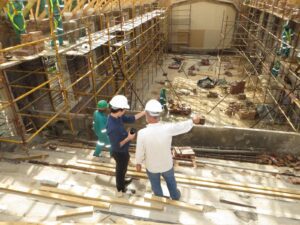Accuracy is not just a virtue but also a requirement in the dynamic and varied field of commercial building. A project’s success is a complex tapestry woven together by every detail, component, and labor hour. An unsung hero in the construction industry, a commercial estimator plays a crucial part in resolving this complexity because they are responsible for managing the delicate balance between budget and quality in addition to cost calculations. To ensure the venture’s profitability, the commercial estimator navigates the complex world of procurement and price.
In this blog, we deeply dive into the intriguing field of commercial estimating services, dissecting various approaches and shedding light on the crucial factors that serve as the foundation for the design’s financial viability. It’s a voyage inside the beating heart of the construction, where exacting calculations collide with ambitious goals and where a project’s economic viability takes life under the skilled guidance of these committed experts.
I. Understanding Commercial Estimating
Commercial estimation is what keeps every construction project alive at its core. It’s more than just a math exercise; it’s a fine art that carefully balances the real and imaginary parts of a project’s finances. Estimating costs and creating a thorough financial story that considers the complexities of building dynamics falls on estimators, who are the masters of fiscal foresight.
In the broad field of commercial estimating, the task goes beyond the simple computation of material and labor costs. Financial estimators consider every scenario that could impact the project’s financial outcome. A wide range of cost factors must be taken into account by estimators, from the raw materials that make up the framework to the expert labor that gives architectural ideas life. It’s more than just figuring out the cost of real estate; it’s about planning the symphony of costs, including overhead, unanticipated events, and the subtleties of market swings.
However, a commercial estimator’s work involves more than just the figures on a balance sheet. In the construction industry, these people are akin to financial investigators. Consider them astute observers of what is and is not trending in the marketplace. They are constantly alert to the newest beat and tune their ears to the rhythm of supplier relationships.
II. The Procurement Art and Science
Estimating Costs
Project Estimation: To determine the total cost of a project, estimators examine project specifications, requirements, and other relevant data. This covers overhead, labor, supplies, machinery, and any other related expenses.
Strategic Sourcing
In the construction sector, procurement entails strategic sourcing, which requires estimators to find trustworthy vendors with reasonable rates.
- Sourcing Suppliers: Strategic sourcing makes procurement in the construction sector more than just a transaction. Commercial estimators carefully choose suppliers who are not simply vendors but essential collaborators on the building project. The aim is to obtain materials at cost-effective rates without compromising on quality.
- Obtaining Quotes: Estimators contact vendors to acquire pricing quotes for the necessary materials. Quality of material, delivery schedules, and payment terms are some of the things they consider.
- Getting the Best Offers Without Giving Up: An effective commercial estimator can strike a balance between quality and cost. This is where their talent shines. Value matters more than just the numbers. This round delves into the calculated choices that estimators make to secure the greatest prices without sacrificing quality. It’s a delicate ballet, with each step carefully considered to yield the best outcomes for the undertaking.
Labor Procurement
- Labor Rates: Estimators must consider labor expenses, which entails determining the proper labor rates for various specialized individuals.
- Subcontractor Bids: Estimators may ask subcontractors to submit bids for specialized work. This entails getting quotations for particular jobs that might be contracted out, such as plumbing or electrical work.
Equipment Expenses
- Equipment Rental: Estimators will account for the cost of renting or leasing any particular machinery or equipment needed for the project. This can include specialized tools or large equipment like cranes.
Direct and Indirect Expenses:
- General Overhead: Estimators take into account general overhead expenditures, which include things like office space, administrative staff, and other indirect costs that are required for the business to run smoothly overall.
- Bonding and insurance: The price of bonding and insurance is considered to cover any potential risks and liabilities related to the project.
Markup:
- Profit Margin: Estimators increase the total anticipated cost by a profit margin. This is the project’s profit target set by the contractor, which serves as a safety net against unanticipated expenses.
- Contingency: To cover for unforeseen circumstances or changes during the project, estimators usually include a contingency figure and profit.
Bid Submission:
- Documenting the Estimate: Following the completion of the estimate, the commercial estimator gathers all relevant data and creates an extensive bid document. This contains a summary of expenses, project requirements, and other pertinent information.
- Bid Submission: Estimators send their offers to prospective customers or project owners. This entails outlining the project’s budget, schedule, and other pertinent data.
Conclusion
In conclusion, commercial estimators handle pricing and procurement in a dynamic process that requires a diversified approach. Estimators use a deliberate combination of industry knowledge and analytical abilities to do everything from source supplies and calculating labor rates to consider equipment costs accounting for overhead.
They maintain accuracy and competitiveness in their bids by utilizing market insights and technology. As the last stage of this process, submitting the bid summarises their work, giving clients clear cost breakdowns and demonstrating the estimator’s dedication to completing projects successfully and within budget. Commercial estimating companies are critical in promoting profitability, efficiency, and openness in the construction industry.



